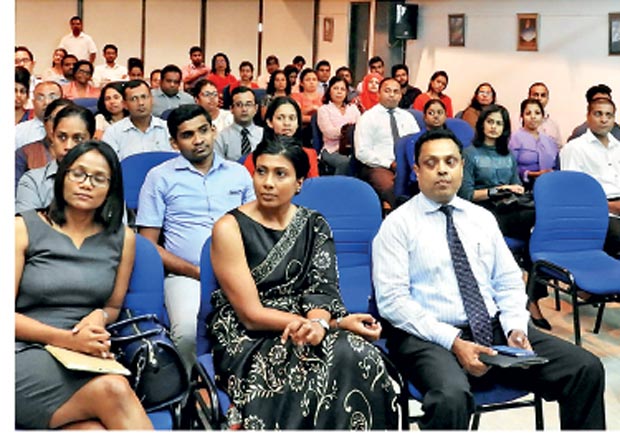07 Oct 2017 - {{hitsCtrl.values.hits}}

The third edition of the EFC HR/IR Forum for 2017, powered by Unilever Sri Lanka, was held recently at the Employers’ Federation of Ceylon (EFC).
The forum deliberated on the topics of recruitment, retention and succession.
The panel comprised of Kelani Valley Plantations PLC and Talawakelle Tea Estates PLC Managing Director Roshan Rajadurai, Hayleys Group Group Security Human Resources, Legal, Corporate Communication and Sustainability Head Dharshi Talpahewa, Coats Thread Exports (Pvt.) Ltd Human Resources Director Roshan Kulasuriya, Virtusa Polaris Sri Lanka Human Resources Senior Director Chandi Dharmaratne and Hidramani Group Group HR Head Chamindra Dassanayake. The panel discussion was moderated by EFC Director General Kanishka Weerasinghe.
Setting the stage for the discussion, Weerasinghe stated that this event would be considered as the first in the series of stakeholder interaction on these important issues, which he hopes to make use of in addressing the growing youth concerns and finding feasible solutions to the issues faced by an ageing workforce.
The panel discussion commenced with ‘recruitment’ where the panellists deliberated on common attributes considered in recruiting new employees. Talpahewa observed that the applicant’s skills as per job requirement, his/her ability to fit into the job role as well as into the ‘culture’ of the company are imperative.
She also emphasized on the importance of ‘soft skills’. Commenting on pre-recruitment aspects, Talpahewa further noted that third party assistance such as reference systems are used in the recruitment process and situational tests to assess applicants.
Hiring for potential, cannot be underpinned, observed Kulasuriya, who noted that those with the necessary drive to achieve will be the most suitable for recruitment, given their ability to adapt to changes in the business environment.
Dassanayake noted that the unavailability of labour is the biggest stumbling block faced when recruiting blue-collar workers. In response to an observation made by a member of the audience that despite many applications being received for blue-collar jobs, only a few applicants actually turn up for interviews, Dharmaratne remarked that technology can be used to make the interview process more expeditious and thereby increase participation.
During the discussion on ‘retention’, Talpahewa asserted that achievements of employees must be recognized and duly rewarded. The need for creating the ‘ambience’ of a workplace from the point of recruitment, for long-term engagement with the employees was accentuated by all panellists.
The challenges placed before the plantation sector, which has to compete with the leisure, industry, service and manufacturing sectors, are unprecedented today, especially in retaining talent, remarked Rajadurai. The role expected of mangers in the plantation sector, who are considered the focal point, become even more demanding in such a context, he added. Dassanayake stressed the importance of looking into both physical and mental well-being of employees and urged for the maintenance of a ‘well-being index’ in factories for this purpose.
In terms of ‘succession’, Dharmaratne addressed the importance of a transparent career progression path for young employees. She also observed that a key factor to consider for promotions at a senior level is whether the successor is ready to take over the duties of the employee, who is considered for such a promotion. This in turn will encourage employees to groom their successor, she noted. Kulasuriya added that the management of an organisation has to play a proactive role in succession planning.
The age of retirement for the private sector and succession plans were also mooted at the forum. While grooming the ‘young blood’ to succeed, a mechanism to harness the expertise of the ‘retired’, especially in an era where new demographic trends are unfolding, was also urged for by the experts.
01 Jan 2025 15 minute ago
01 Jan 2025 41 minute ago
01 Jan 2025 1 hours ago
01 Jan 2025 2 hours ago
01 Jan 2025 3 hours ago